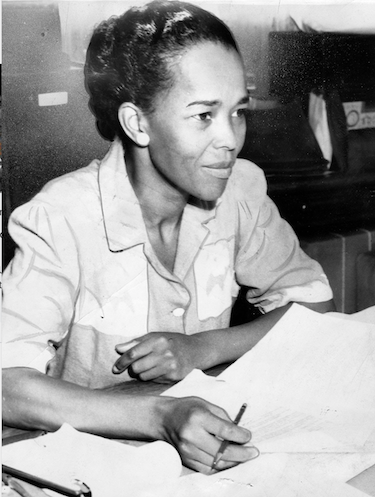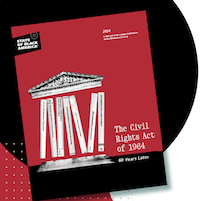Until the killing of black men, black mothers’ sons, becomes as important to the rest of the country as the killing of a white mother’s son — we who believe in freedom cannot rest until this happens.
– Ella Baker

As Women’s History Month continues, I wanted to highlight again another transforming woman whose name I hope young people will learn: Ella Josephine Baker. Ella Baker said this 60 years ago as she was speaking about the murders of Freedom Summer workers James Chaney, Andrew Goodman, and Michael Schwerner, who disappeared together in Mississippi in June 1964. During the nationally publicized weeks-long search for Chaney, who was black, and Goodman and Schwerner, who were white, FBI investigators also found the bodies of several other murdered black men whose disappearances had not received the same attention. Ella Baker’s statement was a rallying cry that has never stopped resonating. She was a lifelong warrior against injustice and inequality, a mentor for my generation of civil rights activists, a powerful advisor to colleagues like Dr. Martin Luther King, Jr., and always, always, unwilling to rest.
Sweet Honey in the Rock’s Bernice Johnson Reagon featured those words in the stirring “Ella’s Song” — we who believe in freedom cannot rest until it comes — and she and I were both among the hundreds of young people Ella Baker mentored. Ella Baker believed in servant leadership and shared leadership rather than charismatic leadership, and always encouraged young people to find and lift their own voices and join them with others.
Ella Baker grew up in Norfolk, Virginia, and graduated as valedictorian of her class at Shaw University in Raleigh, North Carolina, before moving to Harlem, where her life as an activist took root over several decades. She eventually worked with the NAACP as a field secretary, National Director of Branches, and director of the New York office, pushing for organizational structure just as she would do when she helped establish both the Southern Christian Leadership Conference (SCLC) and the Student Nonviolent Coordinating Committee (SNCC).
She was the one who sat down with Bayard Rustin and Stanley Levison to discuss how to create a continuing movement out of the Montgomery bus boycott, leading to SCLC’s formation. As the first SCLC staff member, she was the one who tried to put the new organization in operating order so that Dr. King was not just a leader who reacted to and jumped from one event to the next. She worked to give SCLC the capacity to plan and implement action. And Ella Baker was the one who convinced Dr. King to bring me and about 200 other black college students who had been arrested for engaging in lunch counter sit-ins around the South to a meeting at her alma mater, Shaw University, in April 1960 — the meeting where SNCC was founded. I was a senior at Spelman College, and my first plane ride ever was from Atlanta to Raleigh for that meeting. Ella Baker fought to make sure the students retained our own independent organization rather than simply becoming the youth arm of the SCLC. Julian Bond, Diane Nash, Bob Moses, and many other fellow student activists and young activists were all influenced by her example, counsel, and convening, and we all shared a special debt of reverence and gratitude.
Ella Baker was tough and disciplined and demanded the best of the young and older adults around her. She understood that movement building was about more than protests and meetings and speeches — it was hard, daily, persistent, and sacrificial behind-the-scenes work. She was an institution builder and stressed the importance of strong institutions that could last over time rather than reliance on a single strong leader. And as a woman, Ella Baker was fully aware of but unintimidated by the men she worked with who devalued the advice of women and sometimes resented her forcefulness, prodding, and “mothering.” She made no special effort to be ingratiating.
She labored at SCLC as she had at the NAACP to raise money, conduct voter registration drives, speak to citizen groups (sometimes ten times a day), and travel to community after community to help people help themselves. She warned against SCLC becoming “a cult of personality” for Dr. King rather than an organized means of empowering others, and she eventually left SCLC after deciding that movement building was more important than the specific organization and personalities involved. At a gathering celebrating Ella Baker’s 75th birthday, Bob Moses called her the “Fundi,” the person in the community who masters a craft with the help of the community and teaches it to other people. Fundi became the title of a film on her extraordinary life and work.
Ella Baker remains my civil rights generation’s Fundi. The Children’s Defense Fund Freedom Schools® Ella Baker Child Policy Training Institute proudly honors her. Sixty years after she taught us that we who believe in freedom cannot rest until it comes, we can all honor her by keeping her belief in freedom and equality alive until it becomes the reality for every mother’s child.
• • •• • •
 Marian Wright Edelman is Founder and President Emerita of the Children's Defense Fund whose Leave No Child Behind® mission is to ensure every child a Healthy Start, a Head Start, a Fair Start, a Safe Start and a Moral Start in life and successful passage to adulthood with the help of caring families and communities.
Marian Wright Edelman is Founder and President Emerita of the Children's Defense Fund whose Leave No Child Behind® mission is to ensure every child a Healthy Start, a Head Start, a Fair Start, a Safe Start and a Moral Start in life and successful passage to adulthood with the help of caring families and communities. 














